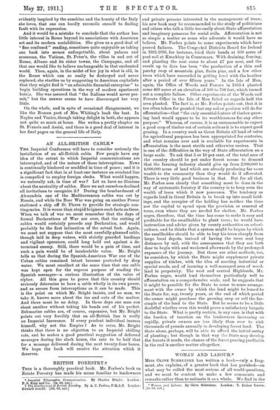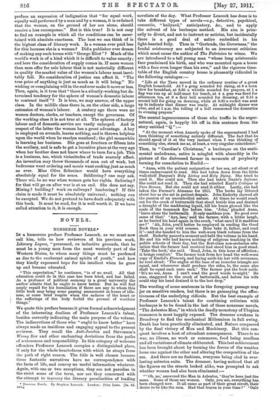WOMAN AND LABOUR.*
Miss OLIVE SCHREINER has written a book—only a frag- ment, she explains, of a greater book that has perished—on what may be called the most serious of all world-questions, and we must be content to make a few comments and remarks rather than to estimate it as a whole. We find in the
• Woman and Labour. By Olive Behreinerr, London; T. 'isher Unwin. [So. C.d. not.] preface an expression of indignation that "for equal .work, equally well performed by a man and by a woman, it is ordained that the woman, on the ground of her sex alone, should receive a less recompense." But is this true P It is not easy to find an example in which all the conditions can be ascer- tained with absolute exactness. The best we can think of is the highest class of literary work. Is a woman ever paid less for this because she is a woman P Did a publisher ever dream of making any such terms with " George Eliot" P Much of the world's work is of a kind which it is difficult to value exactly; and here the consideration of supply comes in. If more women than men offer for sale labour that is not materially different in quality the market value of the women's labour must inevi- tably fall. No consideration of justice can affect it. "The true price of anything is just as much as it will bring." No wishing or complaining will in the end ever make it more or less. Then, again, is it true that " there is a silently-working but de- termined tendency for the sphere of woman's domestic labour to contract itself "P It is true, we may answer, of the upper class. In the middle class there is, on the other side, a large extension of woman's labour. A century ago there were no women doctors, clerks, or teachers, except the governess. Of the working class it is not true at all. The spheres of factory labour and of domestic service are vastly enlarged. And in respect of the latter the woman has a great advantage. A boy is employed on errands, learns nothing, and is thrown helpless upon the world when he reaches manhood ; the girl meanwhile is learning her business. She goes at fourteen or fifteen into the scullery, and is safe to get a lucrative place at the very age when her brother does not know where to turn for a job. This is a business, too, which vicissitudes of trade scarcely affect. An invention may throw thousands of men out of work, but bedrooms want ordering and meals want cooking just as much as ever. Miss Olive Schreiner would have everything absolutely equal for the sexes. Soldiering P one may ask. There wiL be no war when woman gets her rights. Sailoring for that will go on after war is at an end. She does not say.
Mining ? building ? work on railways P lumbering P If this claim is made it must be absolutely universal; nothing can be excepted. We do not pretend to have dealt adequately with this book. It must be read, for it is well worth it. If we have called attention to it, it is enough.











































 Previous page
Previous page